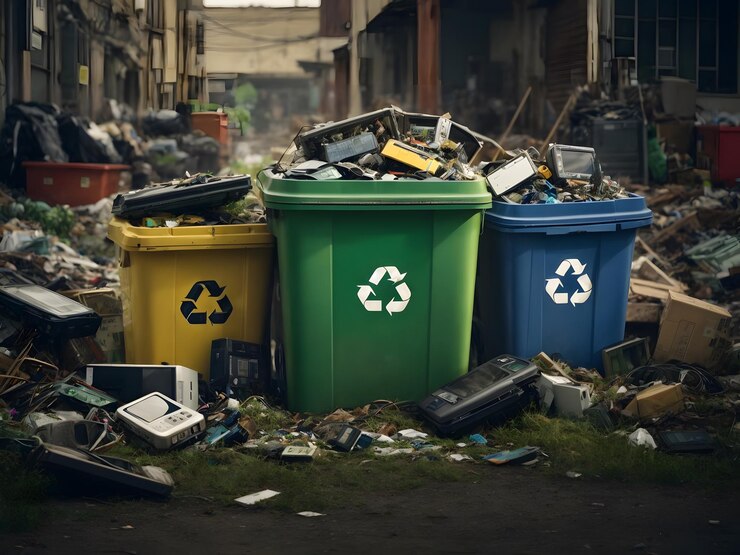Do you know what happens to your old electronic devices when you discard them? As technology advances, the accumulation of electronic waste, or e-waste, poses a significant environmental challenge. So, when it’s time to part ways with your outdated gadgets, how can you ensure they are disposed of responsibly?
To address these questions, choosing the right e-waste collection service is essential. But with so many options available, how do you determine which service is the most suitable? In this article, we’ll explore seven essential features to consider when selecting an e-waste management service. By asking the right questions and understanding the importance of each feature, you can make smart choices that contribute to a cleaner and greener future. Let’s dive in.
Key Features That You Should Keep In Mind While Selecting E-waste Collection Service-
1. Certifications and Compliance:
• Certifications: Look for e-waste collection services that hold certifications such as R2 (Responsible Recycling) or e-Stewards. These certifications indicate that the service meets rigorous standards for responsible handling and recycling of electronic waste.
• Compliance: Ensure that the service provider complies with relevant rules & regulations, such as those outlined by the Environmental Protection Agency (EPA) or state/local authorities. Compliance with laws and regulations make sure that the disposal process meets legal requirements & environmental standards.
2. Data Security:
• Data Sanitization: Verify that the e-waste collection agency offers secure data destruction methods to prevent unauthorized access or retrieval of sensitive information. Data sanitization techniques may include data wiping, degaussing, or physical destruction of storage devices.
• Certification: Look for certifications or compliance with data security standards such as NIST (National Institute of Standards and Technology) or DoD (Department of Defense). These certifications ensure that data destruction processes meet industry-recognized security protocols.
Convenience and Accessibility:
• Drop-off Locations: Choose a service that offers convenient drop-off locations, ideally within close proximity to your home or workplace. Easily accessible drop-off points encourage individuals to participate in e-waste recycling without added inconvenience.
• Pick-up Services: Alternatively, opt for a service that provides pick-up services. This allows you to schedule a convenient time for the collection of electronic waste from your location. Pick-up services are particularly beneficial for businesses or individuals with large quantities of e-waste.
Environmental Commitment:
• Recycling Practices: Inquire about the e-waste collection service’s recycling practices and processes. Look for evidence of responsible dismantling, component recovery, and material recycling to minimize environmental impact.
• Landfill Diversion: Choose a service that prioritizes landfill diversion by maximizing the reuse and recycling of electronic components and materials. Minimizing landfill disposal helps reduce the release of hazardous substances into the environment.
Transparency and Accountability:
• Documentation: Request documentation or certificates detailing the entire e-waste disposal process, from collection to final recycling or disposal. Transparent documentation assures that electronic waste is handled responsibly and ethically.
• Audits and Reports: Some e-waste collection providers conduct audits or provide annual reports on their recycling efforts and environmental impact. Reviewing these audits and reports enhances transparency and accountability within the recycling industry.
Community Engagement:
• Educational Initiatives: Support e-waste disposal services providers that engage with the community through educational workshops, initiatives, or outreach programs. These efforts raise awareness about the significance of e-waste recycling and promote responsible disposal practices.
• Collaboration with Local Organizations: Look for services that collaborate with local schools, businesses, or non-profit organizations to facilitate e-waste collection drives or recycling events. Community partnerships strengthen recycling networks and encourage participation.
Customer Reviews and Reputation:
• Online Reviews: Research the reputation of e-waste collection facilities by reading online reviews and testimonials from previous customers. Positive reviews indicate trustworthy service and customer satisfaction.
• Environmental Track Record: Consider the service’s environmental track record, including past violations or environmental incidents. A reputable e-waste disposal facility maintains a positive reputation and is committed to environmental stewardship.
Final Say!
Individuals can significantly impact environmental sustainability by carefully evaluating e-waste collection services based on the abovementioned essential features. Recycling e-waste responsibly is a moral obligation to protect our environment and preserve valuable resources. Each decision to recycle electronics properly contributes to a greener and cleaner future for future generations. So, let’s make informed choices and embrace e-waste recycling with Reecollabb, an e-waste management company, as a crucial step towards a more sustainable world. Together, we can create a brighter tomorrow for our planet.


